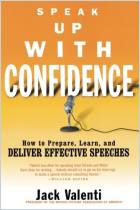Melden Sie sich bei getAbstract an, um die Zusammenfassung zu erhalten.

Melden Sie sich bei getAbstract an, um die Zusammenfassung zu erhalten.
Matt Abrahams
Think Fast, Talk Smart
Communication Techniques
Stanford Business, 2014
Was ist drin?
Embrace calls to speak in spontaneous situations as opportunities to shine.
Recommendation
An estimated 85% of people suffer from a fear of public speaking, and being called upon to speak spontaneously is a nightmare-inducing scenario for many. Presenting at the Stanford Graduate School of Business, communications lecturer Matt Abrahams shares several strategies to help you speak effectively off the cuff. With fun and games, he encourages his audience to embrace occasions to speak ad hoc as opportunities to shine. While his tips may not cure you of your anxiety, they will take the edge off the fear.
Summary
About the Speaker
Matt Abrahams lectures in strategic communication and effective virtual presenting at the Stanford Graduate School of Business.























Comment on this summary